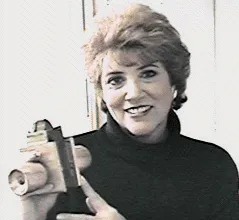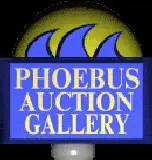
Auctioneer Sold on Fun of
Job Gail Wolpin Offers
Merchandise---and a Show
By Joanne Kimberlin, Daily Press, published November 15th, 1998
The following article was published about our auctioneer and owner in the local newspaper. It really captures the essence of her and the way we do the auction business. Permission has been granted to use the article in other publications. When using, reprinting, or downloading, please credit Joanne and the Daily Press.
Auctioneer Sold on Fun of Job
Gail Wolpin Offers Merchandise---and a Show
By Joanne Kimberlin
Daily Press
Hampton VA
The pounding theme from "2001: A Space Odyssey" engulfs the room. Trumpets wail. Kettle drums thunder. A hundred pairs of eyes focus on the redhead on the elevated wooden podium. Fists clenched, eyes squeezed tight, the woman turned from the audience. She's soaking up the power of the music, pumping herself up for what's to come. As the song fades, she turns, smiles, issues a welcome, and begins the sing-song chant so many have come to hear. "OK, what'll you bid for this fine piece here? Twenty, do I hear 20? Now 30, 30, 30, who's going to bid 30, 30, got 20, need 30 ... " Gail Wolpin is in her element.
The owner of Phoebus Auction Gallery, Wolpin, says this: The hours of quick-fire patter and mounting bids are her favorite part of the business, the payoff for the long, much less glamorous hours spent collecting, unpacking, cataloging, and cleaning. "This is playing day for me," she says. "I have a great time."
It shows in her performance. Framed by rare antiques, artwork, and fine reproductions, Wolpin's running monologue sets the auction's tone. She's warm, gracious, patient, and funny; her authoritative chatter is punctuated with playful remarks about the items up for bid as well as herself. A carving of lovebirds prompts a quick story about the ill-fated live pair she brought home one day. She's not sure exactly how it happened, but somehow, her dog wound up licking feathers off his lips and looking sheepish. "I probably shouldn't have told that story," Wolpin says afterward with a chuckle. "But everything is the seat of the pants' up there - whatever comes out of my mouth. And I've put my foot in it more than once."
One of her ringmen - an assistant helping point out bidders, tries to egg on those contemplating a 19th-century hall table. "Come on, folks! You need this!" he urges emphatically. "Get serious," Wolpin shoots back. "There's nothing in here anybody needs. Only stuff they want."
It's a style that converts the simply curious. "She's really great," says Dawn Bangert of Virginia Beach. She came to Wolpin's latest auction, "Fine Art, Antiques and Rock 'n Roll," on Nov. 1. Bangert's husband and 6-month-old son came, too. "It's a relaxing way to spend a Sunday afternoon," she says. "If I see something I like, I bid on it. If not, I have her to listen to. She's funny." Wolpin says she tries to laugh at herself but never at her audience, unlike some auctioneers, who chastise low bidders or pick out folks to poke fun at. "They're like guests in my home," she says. "Probably more so because I'm here more than I am at my house."
Busy is the way Wolpin likes things. The daughter of a well-to-do merchant from New Castle, Pennsylvania. Wolpin calls herself "one lucky witch." "I was born into a privileged situation, and I'm glad for it. I wish everyone could be so lucky." But hers wasn't a childhood of leisure. Her father saw to that. "He was a man of few words, but every one of them was important," Wolpin says. "I was taught to work, not necessarily for a paycheck."
She cut her teeth at the family shops—a string of discount department stores called Fisher's Big Wheel. By age 11, she was on the floor, selling ladies' wear and hosiery. "I wasn't allowed to work in the men's department," she says with a grin. "You had to measure inseams over there." She married after college, bore two children, and moved to Portsmouth, where her husband opened a medical practice. Her luck took a break when he died a few years later. The next three years were lonely, she says. "I played a lot of tennis. And got really bored."
To get herself going again, Wolpin resorted to what she knew best, opening a discount designer clothing store in the Ghent district of Norfolk. "It caught fire the first day and burned to the ground," she says. "I lost everything except one dress." She rebuilt but sold out when she tired of the trade. A five-year "vacation" followed, during which, she says, even she found herself boring. The only thing that seemed to spark her interest was auctions, something her late mother-in-law had gotten her hooked on. "I became an auction junkie," she says.
One day, a friend asked what she intended to do with the rest of her life. "I think I'll be an auctioneer," came out of her mouth with little thought or seriousness. A brochure from a North Carolina auctioneer school found its way to her desk, courtesy of a friend. It sat there unread for more than a year. "By then, I couldn't stand myself anymore, so I picked it up and made the call."
A few weeks later, she had her license and joined the ranks of "the world's second-oldest profession," as she puts it. Unlike the very oldest profession, though, the folks plying this trade are usually men. Only 10 percent of certified or licensed auctioneers are women. Wolpin's first job was humbling: auctioning off a minister at a local church. "He'd been a priest and was tired of it," she says. "He wanted to date." She was nervous, practicing her chant in the car on the way. She'd never been on stage, she says, or done anything her parents would have considered "making a spectacle of myself." In the hopes of easing her anxiety, she'd invited a friend along, "who promptly fell asleep in the front row." The result, however, was: "I sold the creature. And I had more fun than I'd had in years. That was the moment I became an auctioneer."
She joined the International Society of Appraisers and started taking courses to "get a feel for the value of things. This job takes a lot of general knowledge. Knowing a lot about one thing won't do you much good. You need to know at least a little about 300 different things." The gigs kept coming, and before long she was looking to set up her own shop. She scouted Phoebus, a place she'd stumbled upon earlier while driving around lost. Drawn to its quaint architecture and small-town feel, Wolpin leased and then bought a Mellen Street storefront built in 1905. Her first auction was in 1992. "I cried when it was over," she recalls. "It took me so long to get all that beautiful stuff together, and it was gone in one day." The second auction ended the same, she says, but by the third, "it was more like 'yes!' I knew lots more beautiful things would be coming in the door."
They arrive at her doorstep from all over the globe—from estate sales, going-out-of-business sales, dealers, private collectors, divorces, and remarriages. Bill Welch, Wolpin's new lover and business associate, remembers one couple especially well. "We sold their stuff when they divorced," he says, "and then they got remarried. So we sold the stuff they'd bought while separated."
Each auction features from 300 to 500 items. Most are sold on consignment, with the gallery earning anywhere from 10 percent to 50 percent of the final bid. Items are "reasonably authenticated," either by the consignee or by Wolpin and her staff, Welch says. All are sold "as is." "Once you buy it, it's yours," he says.
Auctions are conducted twice a month now. Each has its own character, focusing on sports or military memorabilia, porcelain, jewelry, crystal, African-American art, decorative arts, or some other collectible. Some feature one-of-a-kind pieces of national and international interest, like the Watergate lock and police report Wolpin auctioned last year. Talks are continuing for other historical pieces, including a Faberge egg that was a birthday gift to Adolph Hitler, an original Picasso, and a painting by 19th-century impressionist forerunner William Turner. One auction featured erotic art, but Wolpin says those have gotten a pretty cool reception in these parts. "It seemed to scare some people," she says. "They got up and left when we reached that part."
Some are dedicated to good causes, like scholarships, medical research, community improvements, and churches. A Habitat for Humanity auction of jewelry was featured in the January 19, 1998, edition of "People" Magazine. Welch figures the gallery has helped local groups raise almost $1 million.
All auctions are accessible in detail on the gallery's website, www.Phoebus Auction Gallery. a contribution of Welch's. Catalogs with photos and profiles of each item up for sale are posted. Bids can be submitted via e-mail or telephone and come in from all over the world.
Wolpin says her goal is to make her business the premier auction gallery in the Mid-Atlantic region. Already a big draw, her place draws customers from both sides of Hampton Roads. "She's bringing in people who would otherwise probably never come to Phoebus," says Arleen Crittenden, executive director of the Phoebus Improvement League. "And that's good for all the businesses down here."
Wolpin plans to keep the fun going for everyone. "Most people love buying," she says. "I love selling. And I especially love selling people things they don't need, since those are the things they usually enjoy most."
CALL (757) 722-9210 for a CONSULTATION with GAIL
